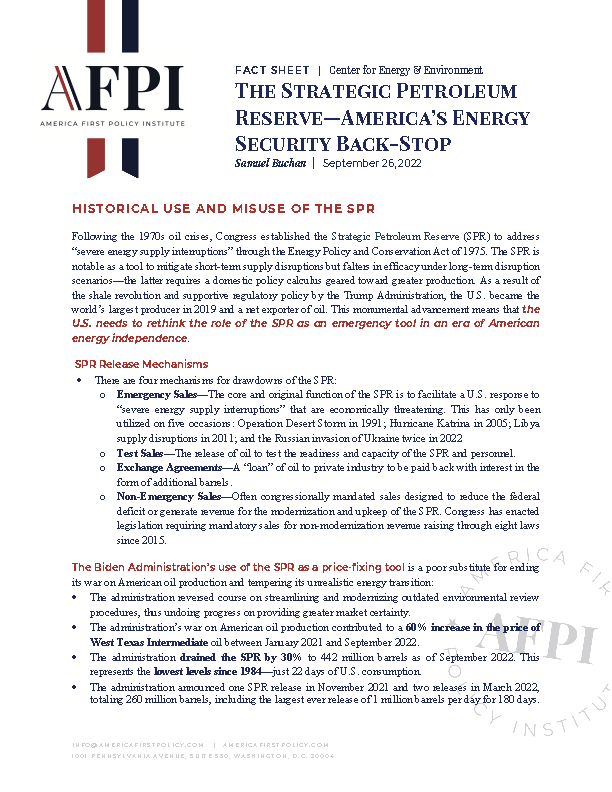The Strategic Petroleum Reserve—America’s Energy Security Back-Stop
Historical use and misuse of the SPR
Following the 1970s oil crises, Congress established the Strategic Petroleum Reserve (SPR) to address “severe energy supply interruptions” through the Energy Policy and Conservation Act of 1975. The SPR is notable as a tool to mitigate short-term supply disruptions but falters in efficacy under long-term disruption scenarios—the latter requires a domestic policy calculus geared toward greater production. As a result of the shale revolution and supportive regulatory policy by the Trump Administration, the U.S. became the world’s largest producer in 2019 and a net exporter of oil. This monumental advancement means that the U.S. needs to rethink the role of the SPR as an emergency tool in an era of American energy independence.
SPR Release Mechanisms
- There are four mechanisms for drawdowns of the SPR:
- Emergency Sales—The core and original function of the SPR is to facilitate a U.S. response to “severe energy supply interruptions” that are economically threatening. This has only been utilized on five occasions: Operation Desert Storm in 1991; Hurricane Katrina in 2005; Libya supply disruptions in 2011; and the Russian invasion of Ukraine twice in 2022
- Test Sales—The release of oil to test the readiness and capacity of the SPR and personnel.
- Exchange Agreements—A “loan” of oil to private industry to be paid back with interest in the form of additional barrels.
- Non-Emergency Sales—Often congressionally mandated sales designed to reduce the federal deficit or generate revenue for the modernization and upkeep of the SPR. Congress has enacted legislation requiring mandatory sales for non-modernization revenue raising through eight laws since 2015.
The Biden Administration’s use of the SPR as a price-fixing tool is a poor substitute for ending its war on American oil production and tempering its unrealistic energy transition:
- The administration reversed course on streamlining and modernizing outdated environmental review procedures, thus undoing progress on providing greater market certainty.
- The administration’s war on American oil production contributed to a 60% increase in the price of West Texas Intermediate oil between January 2021 and September 2022.
- The administration drained the SPR by 30% to 442 million barrels as of September 2022. This represents the lowest levels since 1984—just 22 days of U.S. consumption.
- The administration announced one SPR release in November 2021 and two releases in March 2022, totaling 260 million barrels, including the largest ever release of 1 million barrels per day for 180 days.
the biden administration’s False Assertions
Balancing Markets in Times of Geopolitical Uncertainty: The Biden Administration claims that the use of the SPR has been to counterbalance the economic repercussions of Russia’s war in Ukraine. Unfortunately for the administration, this argument holds little weight as the administration released 50 million barrels of oil from the SPR in November of 2021, before the Russian Federation began amassing troops along Ukraine’s border. Assessment: HIGHLY DUBIOUS
Taming the Price at the Pump & Averting Economic Ruin: The Biden Administration claims that the emergency releases of the SPR have been a response to fossil fuel shortages triggering an energy crisis that is driving up the cost of gasoline, diesel, and necessities like groceries. Unfortunately for the administration, these shortages are in no small part of their own making—a response to its own war on American fossil fuel production that began as a campaign promise and solidified on day one with its cancellation of the critical Keystone XL Pipeline. Additionally, a review of the Biden Administration’s SPR releases demonstrates that the emergency releases of SPR oil have had little to no effect on lowering gas prices—largely due to the long-term nature of the disruption, barriers to domestic production, and a significant loss of domestic refining capacity. Assessment: HIGHLY DUBIOUS
STEPS in modernizing american energy security
- Promote policies that increase congressional oversight by limiting the duration of presidentially declared national emergencies to no more than 60 days and requiring Congressional approval for reauthorization.
- Codify operational guidelines and criteria for “severe energy supply interruptions” to safeguard American energy security and national security above all.
- Establish a bipartisan National Emergency SPR Response Task Force to review and authorize SPR releases in response to severe energy supply interruptions. The Task Force could be comprised of the Speaker of the House, the House Minority Leader, the Senate Majority Leader, and the Senate Minority Leader, and overseen by the Vice President.
- Require administrations to submit an annual report for the Task Force’s approval identifying barriers to domestic energy production and outlining measures to foster greater production.
- Prohibit future non-emergency SPR releases that view the SPR as a revenue-generating crutch for poor fiscal policy while neglecting the national and energy security implications. Revenue generation should exclusively be limited to the modernization and upkeep of the SPR itself or through the lease of oil stocks to U.S. strategic partners that continue to be net importers of oil.
- Prioritize SPR Exchange Agreements to support the continuity of commercial operations for producers, refiners, and millions of American consumers, rather than embracing the status quo of distorting markets to the disservice of American industry.
- Notable legislation includes: the “Strategic Production Response Act” (H.R. 6176—117th Congress), the “Reserving Energy for Independence and Empowerment Act” (H.R. 8766—117th Congress), the “Strategic Petroleum Reserve Anti-Exploitation Act” (H.R. 7996—117th Congress) and the “Strategic Petroleum Reserve Reform Act” (H.R. 6511—115th Congress)
